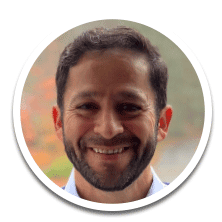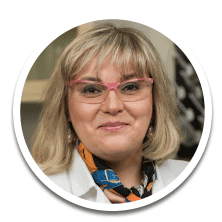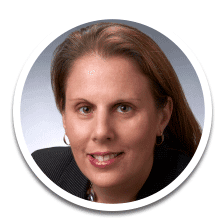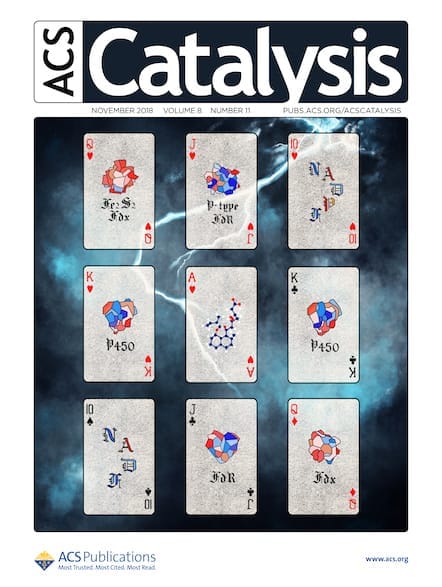ACS Catalysis Editor-in-Chief Cathleen Crudden is delighted to announce the appointment of three new Topic Editors to the journal’s editorial team, effective August 1, 2021. “Seeing catalytic reactions move from the bench to the kilo lab to pilot plants truly illustrates the impact of catalytic processes on all of our lives, and at ACS Catalysiswe want […]

ACS Catalysis Editor-in-Chief Cathleen Crudden is delighted to announce the appointment of three new Topic Editors to the journal’s editorial team, effective August 1, 2021.
“Seeing catalytic reactions move from the bench to the kilo lab to pilot plants truly illustrates the impact of catalytic processes on all of our lives, and at ACS Catalysiswe want to be at the forefront of bringing these discoveries to our readers,” Crudden says. “The Topic Editors will serve in much the same capacity as the existing 17 Associate Editors to handle manuscripts, interact with authors virtually and in-person, and advise on the strategic direction of ACS Catalysis. They will help us ensure that authors, readers, and reviewers from all different types of research institutions are represented on the team.”
I recently sat down with each Topic Editor from industry to discuss the new role. Read on to find out what they said and to learn why Crudden says we can “expect to see the best catalysis work from industry in the pages of ACS Catalysis!”
Dr. Carlos A. Martinez, Pfizer

“Carlos is the Leader for the Biocatalysis Center of Excellence within the Chemical R&D Department in the Pharmaceutical Science Small Molecular organization in WRDM Pfizer. He is responsible for leading the development of new biocatalysis technologies and the implementation of those in the manufacture of active pharmaceutical ingredients (API),” says Crudden. “Following studies at Universidad del Valle in Cali Colombia, University of Florida, and Caltech, Carlos brings expertise in biocatalysis, enzymatic process development, and enzyme engineering. We warmly welcome Dr. Martinez to our team!”
One of the reasons for adding Topic Editors exclusively from Industry at ACS Catalysis is to help us highlight the outstanding catalysis work being done in Industry. How do you think this can best be accomplished?
I am excited that ACS Catalysishas decided to enhance the inclusion of contributions from industry. Implementing catalysts in industry requires focus on a broader set of performance metrics beyond catalyst load, selectivity, and turnover number; and must include stability, cost, and green chemistry metrics as well. I want the Topic Editors to bring greater understanding to readers about implementation in large-scale applications and exposure to catalysts that are developed in industry as well.
Who has been an inspiration to you in the field?
Professor J. Bryan Jones (University of Toronto), a true pioneer in biocatalysis, inspired me to see the wonders of enzymes in chemical synthesis. My scientific growth in the field of biocatalysis was nurtured by two very bright scientists in Professor Jon Stewart (University of Florida), for my Ph.D. and Professor Frances Arnold (Caltech) for my postdoc.
Why do you think it’s important for people in under-represented groups to take on leadership roles?
Leadership in the modern world demands the same awareness and aptitudes to influence and inspire a diverse talent pool in the workforce. People coming from under-represented groups may have an increased sense of awareness in matters associated with inclusivity, equity, and recognizing the need to capture diverse ideas to solve complex problems.
How do you decide yourself whether you should take on a given leadership opportunity in addition to everything else you do?
Learning, connecting with, and influencing people are key drivers. Discovering new aptitudes and strengths within myself is something that drives me to consider new challenges.
What advice would you give to chemists and engineers pursuing collaborations between industry and academia?
Maintain an open mindset to learn from each other, and recognize innovation happens at both places. The biggest difference might be that in industry, the mindset focuses on developing truly implementable solutions.
What advice would you give to young chemists and engineers just starting their careers?
A positive attitude and disposition towards opportunities (sometimes seen as challenges) is perhaps the best way to discover your aptitudes, strengths, and passions in life.
A recent ACS Article from Dr. Carlos Martinez:
A Chemoenzymatic Route to Chiral Intermediates Used in the Multikilogram Synthesis of a Gamma Secretase Inhibitor
Org. Process Res. Dev. 2017, 21, 6, 871–877
DOI: 10.1021/acs.oprd.7b00096
Dr. Beata Kilos-Réaume, Dow Chemical Company

“Beata completed her Ph.D. in Chemistry jointly in Poznan, Poland and in Villeurbanne, France with a prestigious Marie Curie Fellowship, followed by a postdoctoral fellowship with Enrique Iglesia and Alex Bell on oxidation catalysis before joining Dow,” Crudden says. “Named a 2017 ACS Rising Star and 2018 ACS Early Career Fellow of the Industrial & Engineering Chemistry Division, she has also been deeply involved in the Michigan Catalysis Society and the North American Catalysis Society. Beata brings expertise in heterogeneous catalysis, oxidation catalysis, carbonylation chemistry, zeolites, and mesoporous molecular sieves. We’re delighted to have Dr. Kilos on our editorial team!”
One of the reasons for adding Topic Editors exclusively from Industry at ACS Catalysis is to help us highlight the outstanding catalysis work being done in Industry. How do you think this can best be accomplished?
Given competitive pressures to protect new discoveries, highlighting such work is often challenging. Topic Editors from industry are uniquely positioned to appreciate such sensitivities and to work with authors and their organizations to highlight groundbreaking research as soon as possible after patents are published. By its very nature, industrial research tends to be closely related to market and societal trends as well as to the latest scientific developments. In my opinion, a holistic view of catalysis in this broader context spurs innovation to focus technical advances on problems that significantly benefit our industry and society at large.
Why do you think it’s important for people in under-represented groups to take on leadership roles?
Seeing someone like yourself attain a leadership position and succeeding is critical to inspiring young scientists and engineers to pursue STEM careers, knowing that state-of-the-art scholarship and leadership are well within their sight. In my case, growing up in Poland, Marie Sklodowska Curie’s success in a male-dominated field was pivotal to my choice to pursue a career in chemistry.
Engineering is the art of applying science to address real-world needs. And many needs are best appreciated by under-represented groups. For example, needs for personal care products differ by gender, race, and geography. Understanding these needs is critical to formulating products tailored to address them. Or, for instance, someone who grew up in an impoverished area without a secure water supply might have unique insights into the need for antimicrobial products. Having members of under-represented groups in leadership helps to ensure that such needs are offered appropriate consideration when allocating scarce development resources.
How do you decide yourself whether you should take on a given leadership opportunity in addition to everything else you do?
Time is finite, so there is a cost in taking on a new opportunity: the cost of foregoing other opportunities. As such, I feel it’s critical to consider new opportunities in the context of both current activities and planned or potential future activities. In the famous book “Good to Great,” the author recommended pursuing activities that you’re passionate about, that you can excel at, and where you can truly add significant value. When an opportunity satisfies all three criteria, it’s often an easy call. For example, I was humbled, honored, and inspired when I received the invitation to be a Topic Editor for ACS Catalysisas I believe it’s an exciting and critical role where I can excel.
What advice would you give to chemists and engineers pursuing collaborations between industry and academia?
Having been involved in several collaborations with academia, navigating some diametrically opposed motivations is a great challenge. Academicians strive to disseminate groundbreaking results as widely as possible, while industry seeks to protect such results to leverage a competitive advantage. It’s critical for collaborators to understand each other’s motivation and develop creative and tailored approaches to ensure successful outcomes for all parties: researchers, professors, students, and the industrial partners. This requires frequent and candid communication to develop and maintain alignment and ensure that all parties are engaged toward a common goal. A staged approach with clear milestones helps ensure expectations are shared and understood.
What advice would you give to young chemists and engineers just starting their careers?
Do what you’re passionate about. Never hesitate to take on a challenge because you’ve never done such a thing before, as that is the essence of groundbreaking research. Our industry, as you see it now, will likely not resemble the industry you’ll see towards the end of your career. It’s critical to avoid over-planning or constraining yourself as you face the opportunities and challenges of the future. Surround yourself with a diverse cohort of collaborators from different disciplines, as the most groundbreaking innovations often occur at these intersections.
A recent ACS Article from Dr. Beata Kilos-Réaume:
Acceptorless Dehydrogenative Coupling of Neat Alcohols Using Group VI Sulfide Catalysts
ACS Sustainable Chem. Eng. 2017, 5, 6, 4890–4896
DOI: 10.1021/acssuschemeng.7b00303
Dr. Rebecca Ruck, Merck & Co.

“Rebecca (Becky) is Executive Director of Small Molecule Process R&D Enabling Technologies at Merck & Co., where her team is tasked with leveraging catalysis, biotechnology, and flow chemistry to enable synthetic routes for active pharmaceutical ingredients,” says Crudden. “Following studies at Princeton, Harvard, and Berkeley, she brings expertise in asymmetric catalysis, automation, cross-coupling chemistry, organocatalysis, and process chemistry, as well as an immense passion for driving Women in Chemistry activities. Becky received the American Chemical Society’s 2018 Award for Encouraging Women into Careers in the Chemical Sciences.”
One of the reasons for adding Topic Editors exclusively from Industry at ACS Catalysis is to help us highlight the outstanding catalysis work being done in Industry. How do you think this can best be accomplished?
I am very excited to take on the Topic Editor role in the area of homogeneous catalysis since I know this is a very active area of research in industry. It is critical that we establish ACS Catalysisas the premier catalysis journal for our industry colleagues to publish their latest relevant work to facilitate scientific exchange in this important and growing area of research. We need to reach a critical mass of impactful publications to render this scenario self-sustaining, whereby industry researchers prioritize the journal for their catalysis-focused submissions.
What advice would you give to chemists and engineers pursuing collaborations between industry and academia?
Collaborations between academia and industry enable both sides to build new capabilities, develop talent, and answer questions of scientific curiosity. When pursuing these collaborations, it is crucial for the involved chemists and engineers to identify opportunities that target as many of these questions as possible in order to maximize the value of the work. Furthermore, once the collaboration is in flight, maintaining regular communication is critical to ensure that the team goals remain aligned and that the shared commitment and investment are retained.
Why do you think it’s important for people in under-represented groups to take on leadership roles?
In order to catalyze innovation and address the types of complex, interfacial problems that are now commonplace in chemistry, we need to tap into a diversity of backgrounds, skillsets, and experiences. To realize this benefit of diversity, we need to be able to pique the interest of that diversity in our field. We also know that seeing people who look like you, especially in leadership roles, is an incredibly powerful mechanism to attract that diversity. As a woman leader in organic chemistry, I believe it is my responsibility to use my platform to advocate for women and those from under-represented groups, to connect with early career researchers and facilitate their journeys, and to educate my senior colleagues on how they can be better allies and leaders in the area of DEI.
How do you decide yourself whether you should take on a given leadership opportunity in addition to everything else you do?
As a woman in chemistry, I receive many requests to participate in conferences and other public fora to help diversify teams. This makes it incumbent to be selective about the leadership opportunities I choose. I typically consider several factors: (1) my current and upcoming bandwidth; (2) how the opportunity fits into the balance amongst my portfolio of existing roles; (3) whether the intrinsic values of the new opportunity align with mine; (4) how I can leverage the opportunity to continue to influence the field with my values; and (5) whether I like/respect/admire the people involved. Happily, the Topic Editor role met all of these criteria for me, and, of course, who could pass up working with the editor-in-chief, Cathy Crudden?
Who has been an inspiration to you in the field?
I have many inspirations across chemistry. My advisors through my training (Professor Maitland Jones, Jr., Professor Eric Jacobsen, and Professor Bob Bergman) were each incredible mentors who paved the way for me to get where I am today. They demonstrated different styles of leadership, and I hope I have been able to incorporate elements from all of them into my personal brand. I especially remember Eric, who long ago challenged me with the question: “What are you doing to make the people around you better?.” This has become a staple of my commitment and one that I repeat frequently to others. Many colleagues (internally and externally) during my time at Merck continue to inspire me. There are far too many to name, but they span a variety of roles and career stages, and all represent the consummate reason I continue to be excited by how science and engineering can impact human health!
What advice would you give to young chemists and engineers just starting their careers?
Early career chemists and engineers are so much better-rounded than I was at the same stage, so they could probably give me some useful guidance! That said, my advice is: scientific accomplishments will always be your career currency, but it is likewise important to establish a strong network that includes external collaborators. Understanding how to build one’s network and bring necessary visibility to your scientific accomplishments is critical to success.
A recent ACS Catalysis Article from Dr. Rebecca Ruck:
Using an Automated Monitoring Platform for Investigations of Biphasic Reactions
ACS Catal.2019, 9, 12, 11484–11491
DOI: 10.1021/acscatal.9b03953
